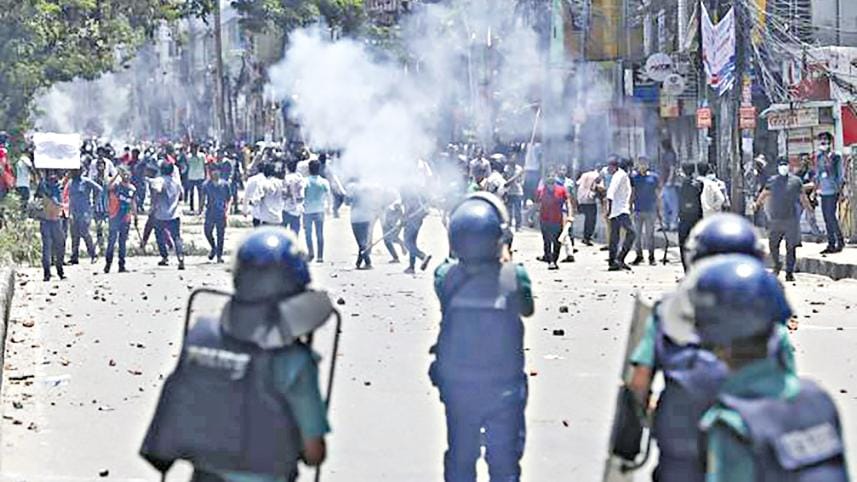Revisiting the Quota Reform Movement and police powers

Amidst the turbulent circumstances arising from the recent Quota Reform Movement, a significant number of allegations were brought against the actions of the police forces. Along with the reports of deaths and injuries, overwhelming number of arrests and detentions without prior explanation, stops and searches, and custodial tortures were reported this time, while the authorities consistently branded such actions as countermeasures to internal political turmoil.
Firstly, Section 54 and 167 of the Code of Criminal Procedure, 1898 (CrPC) gives wide powers to the police to arrest anyone without warrant or even prior explanation, on reasonable suspicion concerning a cognizable offence. However, Article 33(1) of the Constitution contradicts (and prevails over) that by putting a condition that an arrestee should be informed of the grounds of arrest in the shortest time possible.
In the landmark BLAST v Bangladesh (2003) case, the High Court Division pointed out these nuances between provisions of the Code and the Constitution. The court further addressed the vague ambit of 'concerned' cognizable offence under section 54 of the Code, which in turn gives unhindered power to a police officer to arrest any person under arbitrary suspicion, even potentially going against the fundamental rights of life and liberty. The court also chalked out guidelines for the police including necessitating disclosure of identity while making arrests, explaining grounds of arrest and letting the accused to consult a suitable lawyer.
Bangladesh's legal system guarantees transparency, accountability, and preservation human rights, including the prohibition of torture and the protection of privacy. However, the police conduct reveals a gap between the law and its enforcement, emphasising the vital need for reform to preserve fundamental rights and uphold the rule of law.
In Saifuzzaman v State (2004) the court further scrutinised arresting powers by emphasising on expressions such as 'reasonable suspicion' and 'credible information' and providing guidelines on documenting the arrest to stop harassment of the citizens. Therefore, the recent instances of indiscriminate arresting are not lawful as not only they were against the demonstrators' constitutional right to life, liberty, as well as peaceful assembly, but also the relevant laws hold the police accountable for their deeds.
Secondly, there has been complaints and reports against the police and its detective branch regarding torture on the detained demonstrators. In fact, police here have a long-standing vile culture of inflicting third degree method on detainees. Not only does the law not empower them to do so, but also the law condemns such actions punishable under the Bangladesh Penal Code.
Our nation has both domestic and international obligations to condemn custodial torture. Article 35(5) of our Constitution prohibits torture or cruel, inhuman, or degrading punishment or treatment to any person. Bangladesh has also ratified the Convention against Torture and other Cruel, Inhuman, Degrading Treatment or Punishment (CAT) on 5 October 1998, which codifies an absolute prohibition of torture. While Article 2(2) of the CAT prohibits every kind of justification of torture, despite the existence of exceptional circumstances such as war or a threat of war, internal political instability or any other public emergency, Article 13 of the same empowers the victims to such torture with the right to complain and fair trial before competent authorities.
Furthermore, despite the protection provided by Section 197 of the CrPC to public officials like the police from getting convicted for their offences committed in an official capacity, Section 12 of the Prevention of Torture and Custodial Death Act, 2013 renders such excuses for torture inadmissible. This provision is in conformity with Article 2(2) of the CAT. Further in compliance with the CAT, the act prescribes trial and punishment for the delinquent officers under Sections 14 and 15. Ultimately, the plea of a superior's order or internal political unrest is not a defence for delinquent officials liable for custodial torture.
Thirdly, albeit the practice of stop and search being a commonplace for police all over the globe and statutes like The Police Act 1861, the Dhaka Metropolitan Police Ordinance 1976, the Penal Code 1860 and even the Digital Security Act 2018 in fact vest the police in Bangladesh with such power, police operating phone searches on students and pedestrians is a gross misuse of this power and violation to the constitutional right to privacy.
Article 43 of our Constitution provides safeguard against forceful house entry, search and seizure and ensures privacy of correspondence and other means of communication. Article 17 of the ICCPR also enshrines this right. Although reform to police search and seizure is still a long overdue in Bangladesh, constitutional remedy is available to the victims under Articles 44 and 102 of the Constitution.
Bangladesh's legal system guarantees transparency, accountability, and preservation human rights, including the prohibition of torture and the protection of privacy. However, the police conduct reveals a gap between the law and its enforcement, emphasising the vital need for reform to preserve fundamental rights and uphold the rule of law.
The writer is student of law, University of Dhaka.



 For all latest news, follow The Daily Star's Google News channel.
For all latest news, follow The Daily Star's Google News channel.
Comments